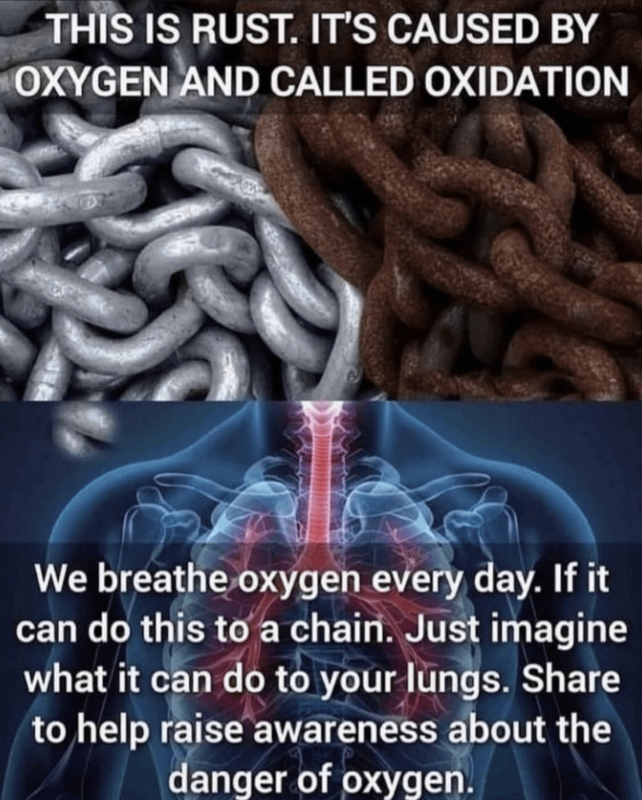Please remember to spread the word about this :(
-
This post did not contain any content.
I've currently been reducing my oxygen intake. My wife keeps telling me it's impossible and my doc says I'll supposedly die, but they're just hating on my progress.
-
I've currently been reducing my oxygen intake. My wife keeps telling me it's impossible and my doc says I'll supposedly die, but they're just hating on my progress.
I got my oxygen intake down to single digits! My family wasn’t supportive however and got me a new pair of lungs, haters
-
On the topic, as oxidation is a pretty prevalent negative side effect of living, our body has multiple mechanisms to deal with it, no? So my question is: where do the "antioxidants" that we can eat come into the picture here? Are they like preventing oxidation from even occurring, or are they like the shields that our cells use to protect themselves from oxidative stress, or what have you?
wrote on last edited by [email protected]Oxidation is the loss of electrons, whereas reduction is the gain of electrons. The mnemonic is OIL RIG: Oxidation Is Loss, Reduction Is Gain.
Oxygen is highly electronegative (second only to fluorine), meaning that it will strongly attract electrons. So, oxygen is good at oxidizing things. It's good at stealing their electrons. (When the oxygen takes the electron, the oxygen becomes reduced!)
The reason that oxygen is so important in your body for respiration is because of its high electronegativity. It is used as the final electron acceptor in a chain of chemical reactions that are used to convert high energy molecules that you've eaten into different high energy molecules that your body can use.
Think of the analogy of a staircase and a ball. The ball is an electron and the stairs are energy states of different molecules along the metabolic pathway. As the ball goes down the stairs, the electron loses energy (which is usually converted to ATP or NADH). At the bottom of the stairs is oxygen, once the electron gets there, it doesn't have anymore potential energy to lose, unless maybe you have some fluorine around. The final, reduced state of oxygen in this pathway is carbon dioxide. It's no longer useful for respiration and thankfully can just be exhaled. How convenient!
An oxygen missing an electron (an oxygen radical) is highly reactive. This is not good. It'll just steal an electron from whatever molecule is nearby. That may be DNA or any other molecule that it's in your best interest to keep intact. Antioxidants are helpful as electron donors, neutralizing radicals before they do damage.
-
This post did not contain any content.
Great now I'm gonna stop breathing.
-
Look at what it did to the Linux kernel too.
::: spoiler Tap for spoiler
Ssshhh. It made it better
:::OOTL? 🥺


-
This post did not contain any content.
Antioxidants exist.
-
OOTL? 🥺


Rust programming language
-
Rust programming language
Oh, but of course! Please excuse my old brain, and thank you.
-
This post did not contain any content.
Imagine what it can do to software
-

-
Have you ever seen asbestos catch fire? Me neither. So it's your choice what you'd prefer breathing in.
Delicious fluorine for me please
-
Oxidation is the loss of electrons, whereas reduction is the gain of electrons. The mnemonic is OIL RIG: Oxidation Is Loss, Reduction Is Gain.
Oxygen is highly electronegative (second only to fluorine), meaning that it will strongly attract electrons. So, oxygen is good at oxidizing things. It's good at stealing their electrons. (When the oxygen takes the electron, the oxygen becomes reduced!)
The reason that oxygen is so important in your body for respiration is because of its high electronegativity. It is used as the final electron acceptor in a chain of chemical reactions that are used to convert high energy molecules that you've eaten into different high energy molecules that your body can use.
Think of the analogy of a staircase and a ball. The ball is an electron and the stairs are energy states of different molecules along the metabolic pathway. As the ball goes down the stairs, the electron loses energy (which is usually converted to ATP or NADH). At the bottom of the stairs is oxygen, once the electron gets there, it doesn't have anymore potential energy to lose, unless maybe you have some fluorine around. The final, reduced state of oxygen in this pathway is carbon dioxide. It's no longer useful for respiration and thankfully can just be exhaled. How convenient!
An oxygen missing an electron (an oxygen radical) is highly reactive. This is not good. It'll just steal an electron from whatever molecule is nearby. That may be DNA or any other molecule that it's in your best interest to keep intact. Antioxidants are helpful as electron donors, neutralizing radicals before they do damage.
antioxidants are our internal sacrificial anodes?
-
Imagine what it can do to software
Those damn electrons!
-
You think that's bad, wait until you hear about dihydrogen monoxide! It's in almost everything, even the water you drink and the air you breathe!
Took me some time
-
I've currently been reducing my oxygen intake. My wife keeps telling me it's impossible and my doc says I'll supposedly die, but they're just hating on my progress.
Big O lackeys are everywhere. They want to keep you alive so they can sell you more O.
-
I've currently been reducing my oxygen intake. My wife keeps telling me it's impossible and my doc says I'll supposedly die, but they're just hating on my progress.
This is a valid athletic technique. Usually achieved by training at altitude.
-
On the topic, as oxidation is a pretty prevalent negative side effect of living, our body has multiple mechanisms to deal with it, no? So my question is: where do the "antioxidants" that we can eat come into the picture here? Are they like preventing oxidation from even occurring, or are they like the shields that our cells use to protect themselves from oxidative stress, or what have you?
Cell mechanisms cause oxidative stress in the body which can lead to inflammation and faster aging. Antioxidants provide the body with an easy way to neutralise the bi-products.
-
wrote on last edited by [email protected]
There are quite a few sci-fi stories and short stories built on a similar concept. One of my favorites is an alien ship lands on a random farm in the US and (leaving a lot of details out, read the book!) it comes to light that the aliens normally live at insanely hot temperatures like 900F (480C) and consider Earth an "Ice World" (that's also the name of the book). Anyway, one of the catches in the book is that farmer figures out the alien wants to trade (again skipping a lot of details) but all he has on him that he can give up is a cigarette (the farmer doesn't know it's super hot inside the ship). He does the trade and we later find out that most of the galaxy is INSANELY vulnerable to being 100% completely utterly addicted to nicotine. When the alien took in the cigarette it instantly vaporized and sent the nicotine into the air and they breathed it and became instantly addicted worse than any opiod addiction IRL.
-
This post did not contain any content.
I mean, oxygen is the most aggressive oxidator, to the point we named the process after it.
-
Unrelated but the bottom navbar in that screenshot makes me long for the Alien Blue days of Reddit. I also just miss that iOS design (along with the OS X Mavericks design)




